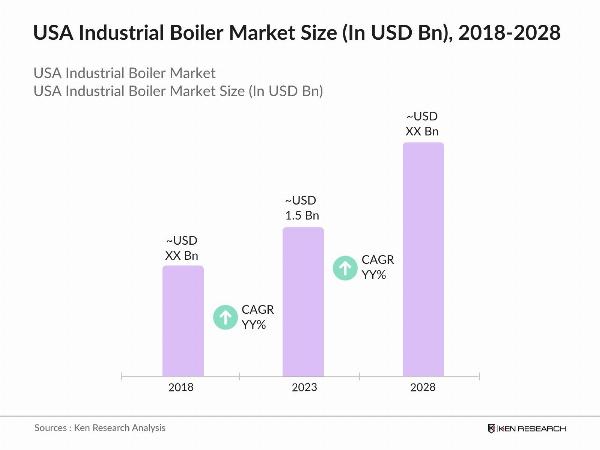Emerging Trends in the USA Industrial Boiler Market

Strong 8k brings an ultra-HD IPTV experience to your living room and your pocket.
The USA Industrial Boiler Market continues to evolve in response to technological advancements, environmental regulations, and the growing demand for energy efficiency. With a market value of USD 1.5 billion in 2023, industrial boilers play a critical role in industries such as power generation, oil & gas, chemicals, and food & beverages. As the demand for more efficient and environmentally friendly solutions grows, several key trends are shaping the future of this market.
In this blog, we will explore the emerging trends in the USA Industrial Boiler Market, highlighting how technological innovations, regulatory pressures, and market dynamics are influencing the sector.
USA Industrial Boiler Market Trends
1. Increasing Demand for Energy-Efficient Boilers
As energy costs continue to rise and industries prioritize sustainability, the demand for energy-efficient boilers has become a key trend in the US industrial boiler market. Modern industrial boilers are being designed to minimize fuel consumption while maximizing output, helping companies reduce operational costs and lower emissions.
Technological Advancements:
Condensing boilers are gaining popularity due to their ability to recover heat from exhaust gases, improving overall energy efficiency.
Innovations such as advanced combustion control systems enable boilers to adjust fuel and air ratios in real-time, optimizing efficiency.
The integration of smart boiler technology allows for continuous monitoring and predictive maintenance, further enhancing fuel efficiency and operational reliability.
Impact on the Market:
This trend is particularly prominent in industries with high energy demands, such as food processing, chemicals, and power generation, where energy savings can result in significant cost reductions. With the rising emphasis on carbon reduction, energy-efficient boilers are becoming a preferred choice for companies seeking to comply with EPA standards.
2. Shift Towards Biomass and Renewable Fuel Boilers
With the growing focus on reducing the industrial sector's carbon footprint, the adoption of biomass boilers and boilers fueled by renewable energy sources is on the rise. Biomass boilers use organic materials such as wood pellets, agricultural residues, and other biomass as fuel, providing an eco-friendly alternative to fossil fuel-based boilers.
Key Drivers:
The USA’s commitment to achieving Net-Zero emissions by 2050 is pushing industries to explore cleaner energy solutions.
Government incentives and subsidies for renewable energy projects are encouraging companies to invest in biomass boilers and other renewable fuel systems.
The low-carbon energy landscape is accelerating the transition from traditional fuel sources like natural gas and oil to renewable fuels.
Market Opportunities:
The food & beverage and agriculture sectors, in particular, are benefiting from biomass boilers, as they often have access to waste materials that can be repurposed as fuel. The trend toward renewable energy boilers is expected to grow as companies across sectors seek more sustainable energy solutions.
3. Adoption of Smart Boiler Technology
The integration of Industrial Internet of Things (IIoT) technology is revolutionizing the industrial boiler market, enabling manufacturers and operators to leverage real-time data for enhanced performance. Smart boilers are equipped with sensors and analytics platforms that provide valuable insights into boiler operations, enabling predictive maintenance, energy optimization, and remote monitoring.
Benefits of IIoT in Boilers:
Real-time monitoring helps detect potential issues early, reducing downtime and extending the lifespan of the boiler.
Predictive maintenance reduces the need for costly repairs by identifying maintenance needs before a breakdown occurs.
Data-driven insights allow companies to improve fuel efficiency, monitor emissions, and optimize boiler operations.
Market Impact:
The adoption of smart boiler technology is becoming increasingly important for industries aiming to optimize their operations and reduce costs. Manufacturing, power generation, and oil & gas sectors are expected to be early adopters of these technologies, driving demand for IIoT-enabled boilers in the coming years.
4. Stringent Environmental Regulations Driving Innovation
Environmental regulations set by the Environmental Protection Agency (EPA) and other governmental bodies are playing a major role in shaping the US industrial Boiler Market. Industrial boilers are subject to stringent controls on emissions of NOx, SOx, carbon dioxide, and other pollutants. Compliance with these regulations is driving innovation in low-emission boiler technologies.
Regulatory Impacts:
The EPA’s Boiler MACT (Maximum Achievable Control Technology) standards set stringent limits on emissions, particularly for coal and biomass-fired boilers.
Industrial companies must adopt advanced emission control systems such as Selective Catalytic Reduction (SCR) and Electrostatic Precipitators (ESP) to meet regulatory requirements.
Technological Innovations:
Companies are developing low-NOx and ultra-low-NOx burners to reduce nitrogen oxide emissions, a primary contributor to smog.
Hybrid boilers that combine traditional fuel sources with renewable fuels or biomass are gaining popularity, as they help industries meet regulatory requirements while maintaining efficiency.
Future Outlook:
As environmental regulations become stricter, companies will need to continue investing in emission control technologies and low-emission boilers to remain compliant. This regulatory-driven innovation will likely push the market toward even greener, more sustainable solutions.
5. Growth in Modular Boiler Systems
Modular boiler systems are becoming a popular choice for industries that require scalable, flexible, and space-efficient solutions. These systems consist of multiple smaller boilers that can be operated individually or together, depending on the steam or heating demand. Modular systems offer significant advantages over traditional large-scale boilers, particularly for industries with fluctuating energy needs.
Key Advantages:
Scalability: Industries can add or remove modules based on demand, making modular boilers ideal for facilities with variable workloads.
Space Efficiency: Modular boilers are compact and require less space for installation, making them suitable for industries where floor space is limited.
Energy Efficiency: Since only the necessary modules are operational at any given time, modular systems reduce fuel consumption and operating costs.
Market Adoption:
The healthcare, educational, and manufacturing sectors are increasingly adopting modular boiler systems due to their flexibility and cost-saving benefits. As industries look for more adaptable solutions, the demand for modular boilers is expected to grow.
6. Rise in Customized Boiler Solutions
Industries today require customized boiler systems tailored to their specific operational needs. Whether it’s high-pressure steam for power generation or low-emission boilers for food processing, companies are demanding systems that meet their unique requirements.
Customized Solutions Include:
High-pressure steam boilers for power plants and industrial manufacturing.
Low-emission and energy-efficient boilers for industries subject to stringent environmental regulations, such as chemical processing.
Hybrid systems that integrate traditional and renewable fuel sources for industries transitioning to greener energy solutions.
Industry Impact:
This trend toward customization is leading manufacturers to offer bespoke boiler designs, providing greater operational flexibility for their clients. As a result, industries across the board are benefitting from solutions that meet their specific production goals while reducing energy consumption and emissions.
Conclusion
The USA Industrial Boiler Market is undergoing significant changes as industries adopt new technologies and prioritize sustainability. The increasing demand for energy-efficient, low-emission boilers, coupled with the rise of smart boiler systems and biomass-based solutions, is shaping the future of this market. As regulatory pressures intensify, companies are focusing on innovation and customization to stay competitive and compliant.
These emerging trends signal a transformative shift toward a more sustainable, efficient, and data-driven industrial boiler landscape. Companies that embrace these changes will be well-positioned to thrive in the evolving market, offering advanced solutions that meet the diverse needs of industries across the USA.
Note: IndiBlogHub features both user-submitted and editorial content. We do not verify third-party contributions. Read our Disclaimer and Privacy Policyfor details.



